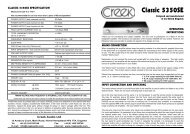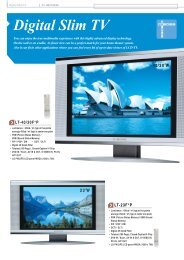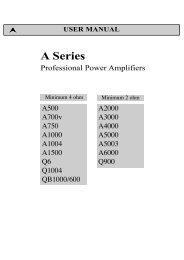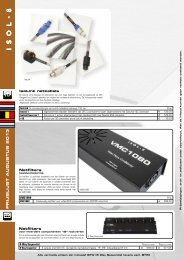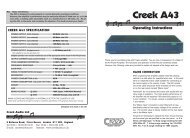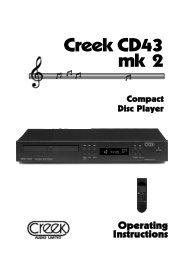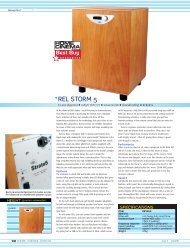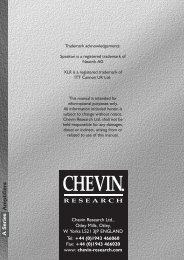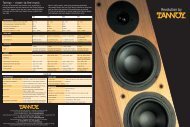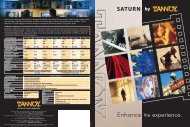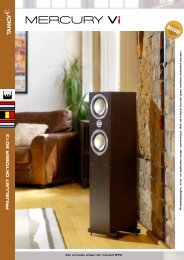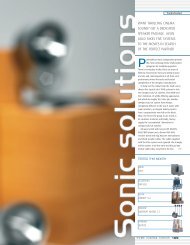Mercury mX Manual (English) A/W
Mercury mX Manual (English) A/W
Mercury mX Manual (English) A/W
You also want an ePaper? Increase the reach of your titles
YUMPU automatically turns print PDFs into web optimized ePapers that Google loves.
4. To protect your speakers and amplifier from damage it is important to ensure that the<br />
amplifier is switched OFF prior to connecting or disconnecting any cabling.<br />
* Correct polarity of the cable connections between the amplifier and speakers is<br />
essential. (See figure 2)<br />
* For optimum performance when connecting the system in standard single wire<br />
mode to a speaker terminal panel equipped with full bi-wiring facility, always make<br />
cable connections, with the links fitted, to the HF terminals.<br />
(See figure 2)<br />
* The positive (plus) terminal on the amplifier left channel (marked + or coloured<br />
red) must be connected to the positive terminal on the left speaker. The left speaker<br />
is the one on the left as you look at the stereo pair from your listening position.<br />
* The negative (minus) terminal on the amplifier left channel (marked - or coloured<br />
black) must be connected to the negative terminal on the left speaker.<br />
* Repeat this connection process for the right speaker. Remember that the positive<br />
(+ or red) on the amplifier must be connected to the positive (+ or red) on the<br />
speaker and the negative (- or black) to negative.<br />
* Select a signal source, such as a CD player; switch on the amplifier and slowly turn<br />
up the volume control to check that both loudspeakers are reproducing bass and<br />
treble information.<br />
FINE TUNING<br />
To get best results from your new Tannoy loudspeakers it is worthwhile spending a little<br />
time finding the optimum set-up configuration.<br />
Here are a few tips to help you with this process:<br />
STAND MOUNTING AND BOOKSHELF SPEAKERS<br />
Small speakers should not be placed directly on the floor but can be used on bookshelves<br />
or tables. However, the sound reproduction quality achieved will never be as good when<br />
not ideally positioned. Your dealer can show you a selection of purpose built stands,<br />
designed to realise the full performance potential of your loudspeakers.<br />
Loudspeaker stands should be rigidly built and preferably mass loaded with dry sand. The<br />
optimum listening height will be dictated by the seating in your room, usually between<br />
300mm (12") and 600mm (24") high. Stand mounted speakers will produce their best<br />
stereo image and soundstage if you can just see the top face of the cabinet. Check the<br />
'lift' needed to put the speakers in this position before purchasing your stands.<br />
Refer to the paragraph headed Positioning for stand mounted speaker placement advice.<br />
(See figure 3)<br />
FLOOR STANDING LOUDSPEAKERS<br />
For optimum performance from floor-standing loudspeakers, the design team at Tannoy<br />
recommends that the supplied carpet piercing spikes be fitted. A rigid footing for the<br />
speaker, with a secure interface between the cabinet and the floor, brings about an<br />
improvement in clarity, bass 'speed' and definition.<br />
First level the spikes by eye then hand tighten the lock nuts. Rock the loudspeaker gently<br />
from side to side so that the spikes find their way through the weave of the carpet and<br />
on to the solid surface below. Once fine adjustments have been made to level the<br />
loudspeaker and ensure stability, tighten the lock nuts firmly but without using undue force.<br />
Refer to the paragraph headed Positioning for floor standing speaker placement advice.<br />
(See figure 3)<br />
4



